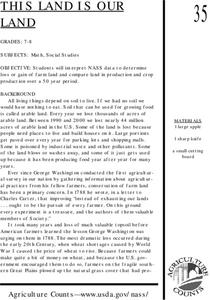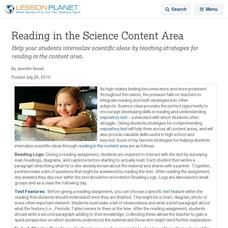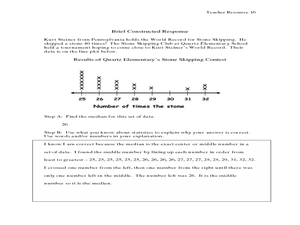Mathematics Vision Project
Module 9: Statistics
All disciplines use data! A seven-lesson unit teaches learners the basics of analyzing all types of data. The unit begins with a study of the shape of data displays and the analysis of a normal distribution. Later lessons discuss the...
Noyce Foundation
Ducklings
The class gets their mean and median all in a row with an assessment task that uses a population of ducklings to work with data displays and measures of central tendency. Pupils create a frequency chart and calculate the mean and median....
Curated OER
Volcanoes and People
Students discover that volcanic eruptions are geologic events that take place within the upper part and on the surface of the Earth's lithosphere. They explain how volcanoes are related to the Earth's lithosphere. They focus on the May...
US Department of Commerce
Featured Activity: Let’s Get the Count Right
Don't leave anyone out. To highlight the importance of the US Census to younger learners, an activity has them distribute markers to see if there are enough for each person. They see that counting the population is necessary to fairly...
Curated OER
This Land is Our Land
Young scholars interpret NASS data to determine loss or gain of farm land and compare land in production and crop production over a 50 year period.
US Department of Commerce
Exploring Sampling Variability - Higher Education Attainment Across The United States
More education in statistics is always beneficial. Given cards that provide the proportion of adults with bachelor's degrees in 10 random US states, scholars individually determine the sample percentage of states in which more than 30...
US Department of Commerce
Using Fractions to Compare Amusements Parks By States
Amuse learners with a lesson on amusement parks and fractions. Using provided census data on the number of amusement parks in each state, third graders represent the fraction of states that fall within a certain range. They create a...
Curated OER
Data! Data! Graph that Data!
Fifth graders create data graphs using Microsoft Excel. In this data collection instructional activity, 5th graders create and conduct a survey, then use Excel to organize and graph their data.
Curated OER
Creating a Graph
Students brainstorm favorite things to do during the summer. They survey classmates to collect data, arrange it in a chart, and create graphs using ClarisWorks.
Curated OER
Biodiversity Study -- A Unit Study
Learners sample a site with low human impact, one with moderate human impact, and a third with high human impact. Students chart the data for each site and then compare the sites and discuss.
Curated OER
Opinions, Please!
Students discuss the meaning and purposes of polls and surveys. After reading an article, they analyze the results of a poll given to residents of New York City. They create a survey of their own and analyze the data to write a written...
Curated OER
Black History Project
Third graders explore and analyze about famous African-Americans by listening to four picture book biographies. They generate a list of 15 famous African-Americans and then create a survey to rank them according to importance of...
Curated OER
Our Favourite Halloween Treat
Students conduct a survey about Halloween candy and create a bar graph illustrating the data. For this data analysis lesson, stud nets are introduced to the topic with a discussion and survey, then the class creates a large graph and...
Curated OER
Stars and The Modern Telescope
In this stars and the modern telescope worksheet, students use a photograph taken by the 2MASS telescope to calculate the number of bright stars and faint stars in the picture, the size of the picture, and the number of stars expected to...
Curated OER
How Many People Live in Your Household?
Students create a pictograph showing household size for the class.In this data collection and graphing lesson, the teacher guides students through the creation of a concrete object graph, then students analyze and summarize the results.
Curated OER
Reading in the Science Content Area
Help your students internalize scientific ideas by teaching strategies for reading in the content area.
Curated OER
Communicating With My World - Day Three: Internet
Students, who are studying ESL, examine the use of web sites. In this web site instructional activity, students watch a teacher demonstration of different types of web sites. They discuss how much time people spend on the Internet. They...
Curated OER
Who is your favorite character from Charlotte’s Web?
In this Charlotte's Web worksheet, students utilize a form with tally marks to gather information on people's favorite characters from the novel Charlotte's Web and then graph out their results.
Curated OER
A Rewarding Endeavor
Learners develop a survey to find out if people would return an envelope of money they found. Include options for giving it to the police, advertising for the one who lost it. Students place their research in a feature article that...
Curated OER
Off the Hook Books
Students complete a survey that gives their teacher an idea of their reading habits and favorite books. The teacher will use the survey in order to build a classroom library that appeals to all students.
Curated OER
Volunteering for Others
Students research the kind of volunteer options for teens in their area, using the Internet and calls to local agencies. Students conduct a simple survey in your school or ask volunteer organizations you contact to help you get in touch...
Curated OER
Backyard Wildlife Conservation
Students survey local wildlife. They distinguish between permanent and migrating or seasonal species. Students identify species and describe the ecological niche. Students research the food chain and food web for the backyard...
Curated OER
Vegetarianism
Students classify ways to stick on a vegetarian diet. Students survey the reasons why others make it or fail on these types of diets. Students aim to improve their understanding of vegetarianism.
National Security Agency
Are You Ready to Call the Guinness Book of Records?
Learners design questions that can be answered by collecting data. In this line-plot lesson, pupils collect data and graph on a line plot on world records. An abundant supply of teacher support is provided in this resource.

























